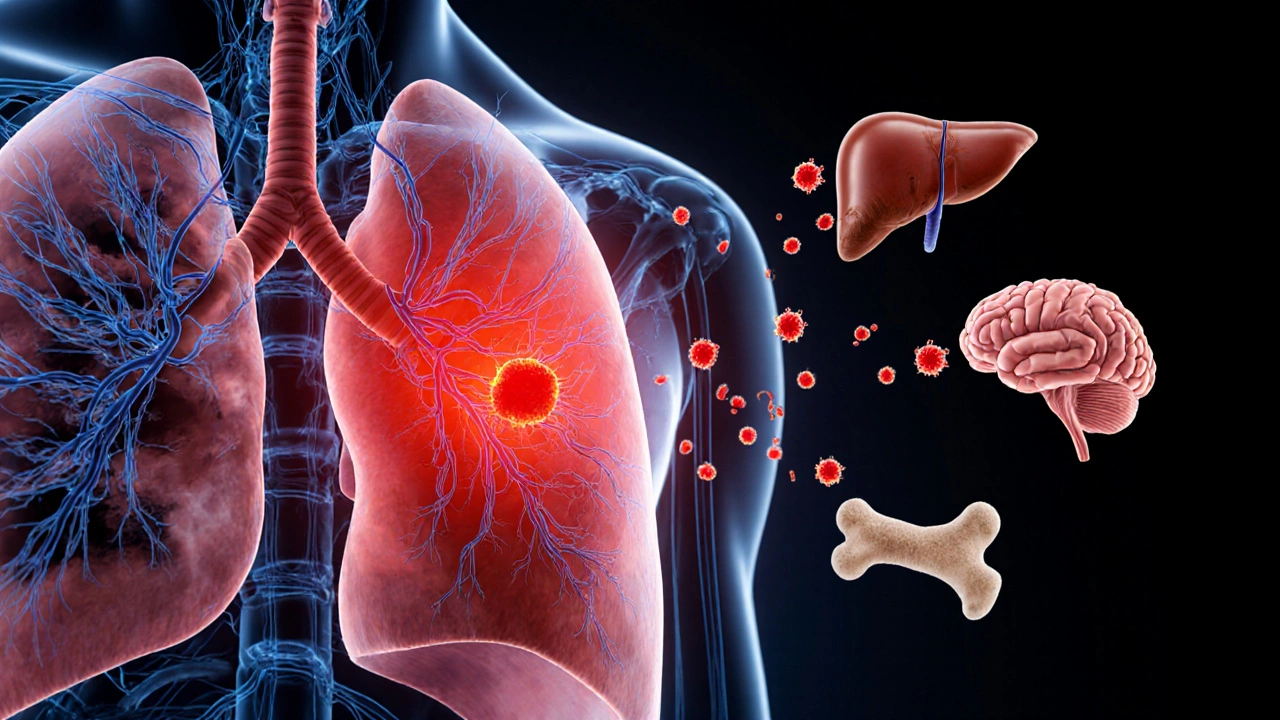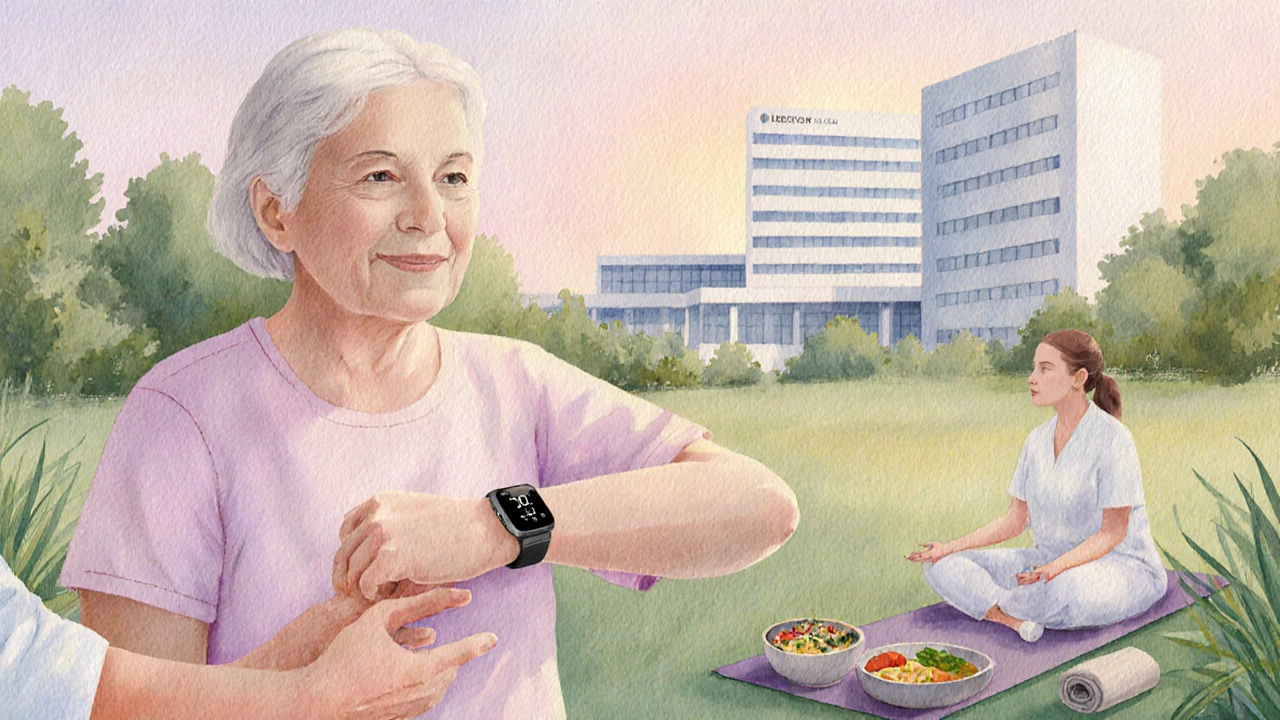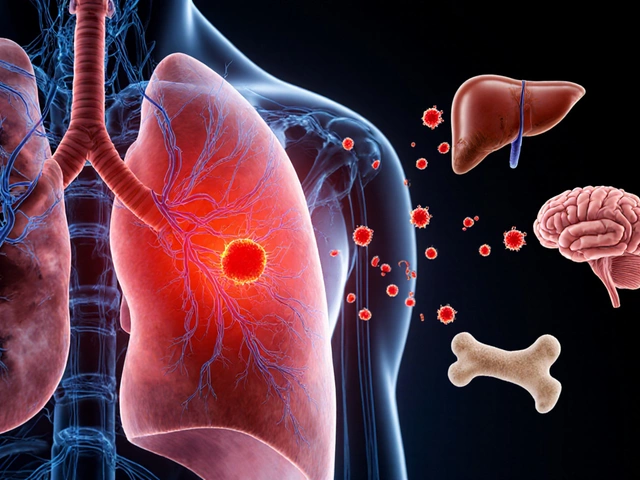
Stage 4 Cancer Cure: Reality, Options & Survival Outlook
Stage 4 Cancer Survival Outlook Calculator
Personalized Survival Estimate
This tool estimates 5-year survival probabilities based on factors discussed in the article. Results are approximate and should be discussed with your oncologist.
Estimated 5-Year Survival Probability
Enter your information to see estimated survival probabilities
Key Takeaways
- Stage4 cancer is rarely curable, but long‑term remission is possible for some patients.
- Modern therapies - immunotherapy, targeted therapy, CART‑cell treatment - have improved survival rates.
- Clinical trials offer access to experimental drugs that may provide curative intent.
- Personal factors (cancer type, genetics, overall health) heavily shape outcomes.
- Early discussion with a multidisciplinary team helps align treatment goals with reality.
What "Stage4 Cancer" Really Means
When doctors say Stage 4 cancer is the most advanced stage where the disease has spread (metastasized) beyond its original organ to distant sites, they’re describing a situation that’s already complex. The cancer cells travel through the bloodstream or lymph system, establishing new tumors in places like the liver, lungs, bone, or brain. Because the disease is no longer confined, treatment goals shift from simply removing a tumor to controlling growth, relieving symptoms, and-in rare cases-achieving a complete response.
Curative Intent vs. Palliative Intent
Not every treatment aims to kill every last cancer cell. Some therapies are given with curative intent-the hope is that the patient will be cancer‑free for the rest of their life. Others focus on palliative care, which means keeping the disease stable, shrinking tumors enough to improve quality of life, and managing pain.
Understanding the difference helps set realistic expectations and avoids the false hope that "everything will be fine" when the data says otherwise.
Major Treatment Options With Curative Potential
Below are the main approaches that can sometimes lead to long‑term remission, even at stage4. Each entry is introduced with microdata so search engines can identify the entity.
- Chemotherapy is a systemic treatment that uses drugs to kill rapidly dividing cells, including cancer cells that have spread. Traditional chemo can shrink tumors, making other therapies more effective.
- Immunotherapy is a class of drugs that boost the body's immune system to recognize and attack cancer cells. Checkpoint inhibitors like pembrolizumab have turned some stage4 lung cancers into long‑term survivors.
- Targeted Therapy is treatment that zeroes in on specific genetic mutations driving tumor growth. For example, HER2‑positive breast cancer responds well to trastuzumab, extending survival dramatically.
- CAR T‑cell Therapy is a personalized immunotherapy where a patient’s T‑cells are engineered to attack cancer cells. Though most approved for blood cancers, emerging trials show promise for solid tumors.
- Clinical Trial is research studies that test new drugs or combinations, often offering access to cutting‑edge treatments before they’re widely available. Enrolling in a trial can be the fastest route to a potentially curative regimen.
Comparison of Curative‑Focused Therapies
| Therapy | Goal | Typical Success Rate (5‑year) | Common Cancers Treated |
|---|---|---|---|
| Chemotherapy | Tumor reduction & systemic control | 5‑15% | Lung, colorectal, breast |
| Immunotherapy | Immune‑mediated eradication | 10‑30% (varies by checkpoint target) | Melanoma, non‑small cell lung, kidney |
| Targeted Therapy | Block specific mutation pathways | 15‑40% for mutation‑positive tumors | Breast (HER2), lung (EGFR), melanoma (BRAF) |
| CAR T‑cell | Engineered immune attack | 30‑50% (mostly hematologic) | Acute lymphoblastic leukemia, certain lymphomas |
| Clinical Trial | Access experimental curative strategies | Varies widely; breakthrough trials report 20‑60% | All solid and blood cancers depending on protocol |
When a Cure Is Possible: Key Influencing Factors
Even with the best drugs, not every stage4 case can be cured. Here are the biggest levers that tip the odds in a patient’s favor:
- Cancer type and biology: Some cancers, like certain melanomas, are more immunogenic and respond better to checkpoint inhibitors.
- Genetic mutations: Presence of targetable alterations (e.g., ALK, EGFR) opens doors to highly effective targeted agents.
- Overall health: Younger patients with good organ function can tolerate aggressive regimens that might lead to remission.
- Extent of metastasis: Fewer metastatic sites usually translate to a higher chance of controlling the disease.
- Access to specialized centers: Hospitals with multidisciplinary tumor boards and trial networks provide more curative pathways.

Real‑World Survival Outlook
Data from the National Cancer Institute (2023) shows that the 5‑year survival for all stage4 cancers combined sits around 10%. However, breaking it down by disease reveals a wide spread:
- Metastatic melanoma: 30‑40% with modern immunotherapy.
- HER2‑positive breast cancer: 20‑30% when combined targeted + chemo.
- Metastatic colorectal cancer with KRAS wild‑type: 15‑25% using anti‑EGFR agents.
- Advanced pancreatic cancer: still under 5% despite all advances.
The takeaway? The word "cure" isn’t a blanket answer-it depends on the cancer’s molecular fingerprint and the treatments available.
How to Navigate Treatment Decisions (A Simple Checklist)
Talking to doctors can feel overwhelming. Use this quick checklist to keep the conversation focused:
- Ask if any remission is a realistic goal given your cancer subtype and genetics.
- Request a genomic test report to see if you qualify for precision medicine options.
- Inquire about ongoing clinical trials that match your profile.
- Clarify the difference between curative and palliative intent for each recommended drug.
- Discuss side‑effect management and how treatment will affect daily life.
Living With Uncertainty: Support Strategies
Even when a cure is out of reach, many patients enjoy years of high‑quality life. Here are practical steps:
- Enroll in a multidisciplinary survivorship program (oncology, nutrition, mental health).
- Use wearable devices to track symptoms and share data with your care team.
- Connect with patient advocacy groups; they often have the latest trial listings.
- Consider integrative therapies-yoga, mindfulness, nutrition counseling-to boost resilience.
Frequently Asked Questions
Can stage4 cancer ever be fully cured?
Full cure is rare, but certain cancers-like metastatic melanoma or HER2‑positive breast cancer-have reported long‑term remission rates of 20‑40% thanks to immunotherapy and targeted agents. Most patients achieve disease control rather than absolute eradication.
What’s the difference between remission and cure?
Remission means cancer is undetectable after treatment, but it could return. Cure implies the disease will never come back. In stage4, doctors usually aim for durable remission.
Are clinical trials worth the risk?
Trials give access to cutting‑edge drugs that aren’t yet standard care. Success rates vary, but many breakthrough cures started in trials. Your oncologist can match you to studies that fit your cancer’s genetics.
How does immunotherapy work for advanced disease?
Immunotherapy releases the brakes on your immune system, allowing T‑cells to recognize and attack cancer cells. Checkpoint inhibitors have turned some stage4 lung cancers into long‑term survivors.
Should I consider stopping treatment if I feel worse?
Only after a thorough discussion with your care team. Sometimes side‑effects outweigh benefits, and a shift to comfort‑focused care is appropriate. The decision should balance quality of life and potential disease control.

Arnav Singh
I am a health expert with a focus on medicine-related topics in India. My work involves researching and writing articles that aim to inform and educate readers about health and wellness practices. I enjoy exploring the intersections of traditional and modern medicine and how they impact healthcare in the Indian context. Writing for various health magazines and platforms allows me to share my insights with a wider audience.
Popular Articles
About
Medical Resource Center India is a comprehensive online platform dedicated to providing reliable health information and medical resources in India. Explore a wide range of articles, tips, and advice on medicine, healthcare services, and wellness. Stay informed about the latest developments in Indian medicine and access valuable insights into maintaining a healthy lifestyle. Discover expert guidance and health solutions tailored for every Indian citizen. Your go-to destination for authoritative medical knowledge in India.




